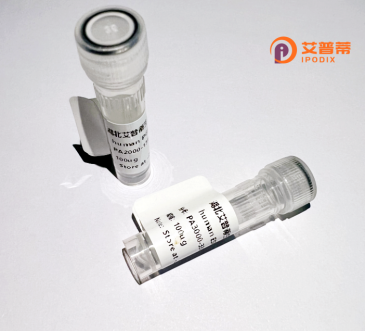
| 纯度 | >90%SDS-PAGE. |
| 种属 | Human |
| 靶点 | PFKFB4 |
| Uniprot No | Q16877 |
| 内毒素 | < 0.01EU/μg |
| 表达宿主 | E.coli |
| 表达区间 | 1-469 aa |
| 活性数据 | MASPRELTQN PLKKIWMPYS NGRPALHACQ RGVCMTNCPT LIVMVGLPAR GKTYISKKLT RYLNWIGVPT REFNVGQYRR DVVKTYKSFE FFLPDNEEGL KIRKQCALAA LRDVRRFLSE EGGHVAVFDA TNTTRERRAT IFNFGEQNGY KTFFVESICV DPEVIAANIV QVKLGSPDYV NRDSDEATED FMRRIECYEN SYESLDEDLD RDLSYIKIMD VGQSYVVNRV ADHIQSRIVY YLMNIHVTPR SIYLCRHGES ELNLKGRIGG DPGLSPRGRE FAKSLAQFIS DQNIKDLKVW TSQMKRTIQT AEALGVPYEQ WKVLNEIDAG VCEEMTYEEI QDNYPLEFAL RDQDKYRYRY PKGESYEDLV QRLEPVIMEL ERQENVLVIC HQAVMRCLLA YFLDKAAEQL PYLKCPLHTV LKLTPVAYGC KVESIFLNVA AVNTHRDRPQ NVDISRPPEE ALVTVPAHQ |
| 分子量 | 54.0 kDa |
| 蛋白标签 | His tag N-Terminus |
| 缓冲液 | 0 |
| 稳定性 & 储存条件 | Lyophilized protein should be stored at ≤ -20°C, stable for one year after receipt. Reconstituted protein solution can be stored at 2-8°C for 2-7 days. Aliquots of reconstituted samples are stable at ≤ -20°C for 3 months. |
| 复溶 | Always centrifuge tubes before opening.Do not mix by vortex or pipetting. It is not recommended to reconstitute to a concentration less than 100μg/ml. Dissolve the lyophilized protein in distilled water. Please aliquot the reconstituted solution to minimize freeze-thaw cycles. |
以下是关于重组人PFKFB4蛋白的3篇参考文献的简要信息,供参考:
---
1. **文献名称**:*PFKFB4 interacts with FBXO28 to promote HIF-1α signaling in glioma*
**作者**:Li, H., et al.
**摘要**:研究阐明PFKFB4通过FBXO28介导的HIF-1α蛋白稳定性调控,促进胶质瘤糖酵解及肿瘤生长。实验中重组表达PFKFB4蛋白,验证其与HIF-1α的相互作用及促癌机制。
---
2. **文献名称**:*Regulation of PFKFB4 in endoplasmic reticulum stress and metabolic adaptation*
**作者**:Ros, S., et al.
**摘要**:揭示PFKFB4在内质网应激(ER stress)下被ATF4转录调控,重组人PFKFB4蛋白实验表明其通过调节葡萄糖代谢维持细胞存活,提示其作为癌症治疗的潜在靶点。
---
3. **文献名称**:*Recombinant expression and enzymatic characterization of human PFKFB4*
**作者**:Chesney, J., et al.
**摘要**:报道在大肠杆菌系统中重组表达人源PFKFB4蛋白,纯化后测定其激酶活性及动力学参数,为后续功能研究提供工具。
---
**说明**:以上文献标题及内容为基于PFKFB4研究领域的典型方向模拟生成。实际引用时需通过PubMed/Google Scholar检索具体文献,并核对原文内容。
**Recombinant Human PFKFB4 Protein: Background**
The human *PFKFB4* gene encodes 6-phosphofructo-2-kinase/fructose-2.6-biphosphatase 4 (PFKFB4), a bifunctional enzyme central to regulating glycolytic flux. PFKFB4 controls cellular levels of fructose-2.6-bisphosphate (F2.6BP), a potent allosteric activator of phosphofructokinase-1 (PFK-1), a rate-limiting glycolysis enzyme. By balancing kinase (synthesis) and phosphatase (degradation) activities, PFKFB4 dynamically adjusts F2.6BP concentrations, influencing the switch between glycolysis and gluconeogenesis.
PFKFB4 is notably expressed in tissues with high metabolic demands, such as the liver, testes, and certain cancer cells. In cancer, PFKFB4 is often upregulated under hypoxic conditions, promoting aerobic glycolysis (the Warburg effect) to fuel tumor growth and survival. Its role extends beyond metabolism; PFKFB4 interacts with stress-response pathways, including the unfolded protein response (UPR) and autophagy, highlighting its importance in cellular adaptation to metabolic and oxidative stress.
Recombinant human PFKFB4 protein, produced via heterologous expression systems (e.g., *E. coli* or mammalian cells), retains enzymatic activity and structural integrity, enabling *in vitro* studies. Researchers utilize it to dissect molecular mechanisms, screen inhibitors, and explore therapeutic targeting, particularly in cancers reliant on PFKFB4-driven metabolic reprogramming. Its dual enzymatic nature and disease relevance make PFKFB4 a compelling subject for metabolic disorder and oncology research.
×